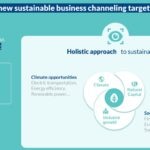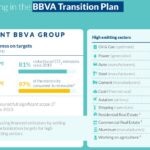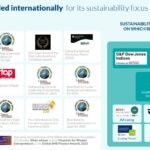Sustainability is a key strategic priority for BBVA, which views the energy transition as an opportunity to move forward and grow. For this reason, it supports its clients and offers advisory and financing services with the aim of contributing to the decarbonization of the economy and generating new business opportunities. Climate, natural capital and inclusive growth are the three pillars underpinning a strategy to build a brighter future starting now, with a new sustainable business mobilization target of €700 billion by 2029.
The transition towards a decarbonized economy not only represents an environmental challenge, but also an immense global investment effort. It is estimated that achieving net zero emissions between 2021 and 2050 will require cumulative investment of around $275 trillion, equivalent to approximately 8% of the world’s annual GDP through the middle of the century.
This huge funding requirement will lead to a structural transformation of key sectors such as energy, transport, construction and heavy industry. However, this won’t happen unless two crucial conditions are met: it must make economic sense and it must be socially just. In other words, the necessary investments must generate a return for those pushing them forward, and the benefits of the transition must also be distributed fairly.
This process is seen as a business opportunity. The financial industry happens to play a pivotal role in mobilizing capital towards sustainable activities, both in the form of direct financing and through investment products, advisory services, or transactional banking.
In this regard, BBVA views sustainability as the greatest business opportunity for the financial industry this decade. This claim finds support if we look at the growing demand from companies seeking to adapt their production models, become more energy efficient, or tap new sources of funding based on environmental, social and corporate governance (ESG) criteria.
Despite the highly fragmented and uncertain global environment, there is no turning back when it comes to sustainability, and it continues to make increasing economic and strategic sense to pursue this path.
How BBVA’s sustainability strategy has changed with time
The bank has made sustainability one of its six strategic priorities. Since 2018, BBVA has worked hard to bolster its sustainability framework, integrating sustainability transversally into its business model and positioning it as a driver of growth, after unveiling its latest strategic plan. This shift of focus has taken place in tandem with the development of the European regulatory framework and in response to changing expectations in the financial market.
BBVA’s sustainability strategy is currently built around three main pillars:
- Climate: financing renewable energy, energy efficiency, clean transport and decarbonization of high-emitting sectors.
- Natural capital: projects related to water management, sustainable land use, waste, and biodiversity.
- Sustainable social development: access to basic services and products, financial inclusion, accessible and affordable housing, and support for SMEs, microenterprises, and entrepreneurs.

In 2021, BBVA set up the Global Sustainability Area, tasked with designing and driving the bank’s sustainability strategy and coordinating its implementation across the Group.
Its functions include:
- Integrating sustainability criteria into products and services.
- Making sustainability part of the process of assessing risks and lending.
- Monitoring the Transition Plan toward descarbonization through the Sustainability Alignment Committee.
- Fostering internal training in sustainability. By 2023, BBVA had trained more than 100,000 employees in sustainability.
The existence of this centralized body allows for greater strategic consistency across the Group, facilitates the development of common methodologies, and helps ensure that local initiatives are suitably aligned with the Group's global objectives.
Channeling of sustainable business: path forward and objectives through 2029
One of the most visible pillars of BBVA's sustainability strategy is the channeling of sustainable business, meaning the cumulative mobilization of financial flows related to activities, clients or products considered sustainable, in accordance with internal standards in turn inspired by existing regulations, market standards, and best market practices.
In December 2024, BBVA achieved its goal of channeling €300 billion in sustainable business, one year ahead of schedule (2025). Following this success, the bank has announced a new target: €700 billion between 2025 and 2029, targeting the same three strategic pillars (climate, natural capital and social development).
Unlike the previous target, which covered an eight-year period, BBVA’s new objective runs for just five years, requiring it to pick up the pace and significantly expand its products and geographies. To succeed, BBVA plans to:
- Continue to expand its portfolio of sustainable products across all segments: retail, business and wholesale.
- Strengthen its presence in emerging sectors linked to the energy transition.
- Ramp up its activity in international markets, especially in developing economies where a significant positive impact can be achieved.
BBVA is fully aware that the transformation toward a more sustainable model also calls for a cultural change. Notably, since 2022, the variable compensation of all its employees has been partially pegged to sustainability targets, such as the volume of sustainable business channeled.
Moreover, long-term compensation linked to the achievement of decarbonization targets has been introduced for certain high-impact profiles (managers, risk takers).
The bank has also set up a network of sectorial experts in sustainability and has developed internal training programs that cover key areas such as risk, financing and customer management.
Key sectors: risks and opportunities
In line with its strategic priorities, BBVA has flagged certain top-priority sectors for channeling sustainable business due to their potential positive impact on sustainability and their weight within the real economy.
Climate pillar:
- Renewable energy: wind, solar and hydroelectric.
- Electric mobility: vehicle financing and charging stations.
- Energy efficiency: in buildings, industrial processes and domestic consumption.
Natural capital pillar:
- Water management and wastewater treatment.
- Sustainable agriculture, with soil conservation and climate adaptation practices.
- Circular economy: reduce, reuse, recycle.
- Biodiversity protection: forestry and habitat restoration projects.
Social pillar:
- Support for SMEs, micro-SMEs and entrepreneurs.
- Social infrastructure: education, health, basic services.
- Financial inclusion: banking penetration and access to credit for vulnerable segments.
BBVA has published a Sustainable Business Channeling Guide describing the criteria used by the bank to classify transactions as sustainable for the purposes of the bank’s Sustainable Channeling Objective for the 2025–2029 horizon.
Commitment to ‘cleantech’
When it comes to climate and natural capital, BBVA is firmly committed to ‘cleantech’ (short for clean technology), meaning innovative technology that nullifies or at least reduces the environmental damage caused by processes that are currently carried out with technologies that have a greater environmental impact. Cleantech not only encompasses major technological developments, but also technology-based services and business models.
Notably, BBVA has a dedicated cleantech unit with highly specialized global advisory and financing teams working out of Houston, New York, London and Madrid. In this cleantech ecosystem, BBVA also supports fast-growing tech enterprises through BBVA Spark—the bank’s unit for entrepreneurs and venture capital investors—, offering them structured financing products (such as venture debt), along with agile and flexible financial solutions tailored to their needs and stages of growth.
So far, the bank has invested €308 million in climate funds focused on decarbonization, such as Lowercarbon, Fifth Wall, Hy24, Just Climate, Suma Capital and Descarbonization Partners, as well as a strategic alliance with KKR where it has invested $200 million in its ongoing global climate strategy.
Transition plans: decarbonization targets by sector through 2030
BBVA aims to achieve zero net emissions by 2050. To succeed, it has set interim targets for 2030 in ten economic sectors with high emissions intensity (oil and gas, electricity, automobile, steel, cement, coal, aviation, maritime transport, aluminum, and real estate in Spain, both commercial and residential). In these sectors, the bank is working to align its financing portfolio with decarbonization pathways compatible with the Paris Agreement.
Concrete objectives here include:
- Oil & gas: 30% reduction in absolute emissions in oil & gas (upstream) between 2021 and 2030.
- Thermal coal: The aim here is to nullify the bank’s exposure to clients engaged in thermal coal mining activities, or thermal coal-fired power generation, by 2030 in developed countries and by 2040 globally (as set out in the Environmental and Social Framework).
- Electricity: 52% reduction in emissions intensity in the electricity generation sector between 2020 and 2030 (kg CO₂e/MWh) (Scopes 1 and 2).
- Automotive: 46% reduction in emissions intensity in the automotive sector between 2020 and 2030, measured in grams of CO2/v-km (Scope 3).
- Other sectors: Emission intensity reduction targets for cement, steel, aviation and shipping, aluminum, commercial and residential real estate.
These targets are monitored annually and disclosed publicly through the Non-Financial Information Statement (NFIS). BBVA uses methodologies such as PACTA (Paris Agreement Capital Transition Assessment) and PCAF (Partnership for Carbon Accounting Financials) to measure the emissions financed.

(1) For the year 2024, estimates are used for data not available at the closing date of the Group Consolidated Management Report 2024; (2) Gross market-based Scope 2 GHG emissions; (3) Scope 3 GHG emissions includes: 3.1 (Purchased goods and services), 3.2 (Capital goods), 3.3 (Fuel and energy-related activities (not included in Scope 1 or Scope 2)), 3.4 (Upstream transportation and distribution), 3.5 (Waste generated in operations), 3.6 (Business travel), 3.7 (Employee commuting), 3.13 (Downstream leased assets); (4) The electricity consumed is 100% renewable in Colombia, Spain, Mexico, Peru, Turkey, Portugal and Uruguay, 92% in the Netherlands, 79% in Venezuela, 74% in Argentina and 29% in Romania; (5) The scope geographic of the intermediate 2030 emission reduction target for the real estate sector is Spain; (6) This planning will be carried out as long as there is a recognized methodology and data available for it.
The main challenges and priorities of this Transition Plan for BBVA are supporting high-emission sectors, expanding the sectoral scope with new climate targets, adapting to increasing regulatory frameworks, and continuously assessing the transition of its clients.
These lines of action make up the framework through which BBVA will continue to pursue its goal of achieving climate neutrality by 2050. The combination of internal tools, evaluation processes, and sector-specific target-setting lays the foundation for its progressive decarbonization strategy.
Transparency and criteria: dissemination of methodologies and tools
In 2025, BBVA doubled down on its commitment to transparency by publishing two documents, both of which can be found on the shareholder and investor website:
- Guide to channeling sustainable business, which sets out the eligibility and measurement criteria for sustainable products and solutions and has been validated by a third party following industry best practices.
- ESG Data Pack, a report in Excel format offering stakeholders key non-financial information relating to 2024, as disclosed in the Group’s Non-Financial Information Statement.
Global Eco-efficiency Plan
BBVA’s climate strategy sets a high bar. The Bank’s targets are set out in the Global Eco-efficiency Plan, which has been in force since 2008 and was renewed in 2021 for the 2021–2025 period. These objectives are primarily focused on reducing direct impacts and on achieving what is known as ‘Goal 2025’. The plan envisions a global strategy for reducing direct impacts predicated on four main lines of action:
- Reducing consumption through energy efficiency initiatives;
- Using renewable energy;
- Raising awareness and engaging with employees and other stakeholders on the path to a low-carbon economy;
- Managing direct environmental impacts by purchasing and retiring carbon credits.
By year-end 2024, the Group had made significant progress in implementing its direct impact reduction strategy:
- More precisely, it had achieved an 81% reduction in operational emissions (Scopes 1 and 2) versus 2019, having succeeded in lowering its operational emissions to 46,337 tons of CO2 by the end of 2024.
- 97% of the electricity consumed by BBVA came from renewable sources.
- It had also broadened the scope for measuring Scope 3 emissions. BBVA will endeavor to estimate the other Scope 3 categories not presently included in its footprint calculation, although they are not believed to have a material impact.
BBVA is busy developing a new Global Eco-efficiency Plan, due to get underway in 2025 and with the targets looking ahead to 2030. It has already set itself an internal target of achieving 100% renewable electricity by 2030.
An operating model that relies on integrating risks and opportunities
Beyond its market positioning, BBVA has embraced a practical approach to making sustainability an integral part of its banking activity. This includes:
- advising retail, business and wholesale clients in how to identify sustainable business opportunities;
- developing digital tools that will enable more energy or economically efficient investment or consumption decisions;
- and making climate and social risk part of the underwriting process.
The bank relies on an internal evaluation system, known as the Transition Risk Indicator, or TRi for short, which screens and classifies clients according to their degree of exposure and adaptation to the energy transition process.
The TRi combines:
- Quantitative indicators: emissions intensity, sectoral exposure, etc.
- Qualitative indicators: existence of transition plans, governance, commitment to decarbonization, etc.
Clients are segmented into four levels: advanced, robust, moderate and deficient. This screening is not just used to assess risks, but also to develop accompanying strategies: specific lines of financing, technical advice, differential conditions, etc.
In 2024, 91% of the loan portfolio in high-emission sectors already had an active TRi assessment. This means that the client has been screened with this tool and classified within the system (regardless of its score), that this assessment is regularly updated and used for business and risk decisions, and that it is a key part of the bank’s control and monitoring system.

BBVA and its social strategy
In 2021, BBVA set itself the goal of channeling €550 million into social initiatives and reaching 100 million people by 2025. Four years later, not only has it achieved this goal, it has done so a year early. Between 2021 and 2024, the bank invested a total of €594 million, benefiting nearly 106 million people across more than a dozen countries.
These efforts take shape in three key areas of action: education, reduced inequalities and entrepreneurship, and culture and research. More than lines of action, they reflect a vision: that sustainability is also built with equity, knowledge and opportunities.
Education as a lever for development
Education is by far the area that garners the most investment. More than 63% of the total (some €370 million) was earmarked for educational programs between 2021 and 2024. Seven million people took part directly in BBVA’s scholarships, teacher training or financial literacy programs and a further 50 million had access to free educational content through platforms such as Aprendemos juntos (Let’s Learn Together), which has fast become a benchmark for digital learning in Spanish.
Projects with a human face...
- Chavos que inspiran (Mexico): more than 50,000 scholarships for vulnerable young people, combined with training support, many of whom are the first in their families to finish university.
- Educación Conectada (Spain): alliance with FAD Juventud to train 20,000 students, teachers and families each year in digital skills.
- Teachers Academy (Turkey): more than 35,000 teachers trained annually by Garanti BBVA on how to instill 21st century skills in their learners.
- Conectados por la educación (Colombia): STEAM program with an open digital library and connectivity for learners and educators alike in rural areas.
- Leer es estar adelante (Perú): improving reading comprehension in primary school with teacher training and books for 25,000 children per year.
- Papagayo (Venezuela): training more than 5,000 educators and 150,000 learners over a 25-year horizon, focusing on educational quality.
- Financial education for young people (Argentina): scholarships and financial and digital education, with some 11,000 young beneficiaries per year.
Microfinance: entrepreneurship at the edge
Financial inclusion is another central pillar of BBVA’s social model. Each year, the BBVA Microfinance Foundation reaches out to more than three million vulnerable entrepreneurs in countries such as Colombia, Peru, Chile, Panama and the Dominican Republic.
The Foundation is totally autonomous and standalone from the BBVA Group, both in its legal personality and in its governance and management. It invests its endowment (€200 million) to create and consolidate a group of microfinance institutions operating across Latin America, whose profits are reinvested in the Foundation’s own activity, with no financial return whatsoever for BBVA. Between 2021 and 2024, these microfinance companies paid out upward of €5 billion in microloans.
The beneficiaries tend to be women, informal workers or small family businesses who find it hard to access the traditional banking system. Aside from credit, the foundation offers financial literacy, basic insurance and digital training.
Research, culture and science: a broader vision of sustainability
The BBVA Foundation has an annual budget of more than €25 million, which it uses to champion projects in science, environment, health, culture and the humanities, doing so through scholarships, awards, research and outreach programs. The foundation is firmly committed to expanding knowledge as an effective means of tackling complex challenges such as climate change, global health and social cohesion.
Emergency response, volunteering and structural solidarity
The bank’s social commitment also becomes visible in the wake of emergency situations. Between 2021 and 2024, BBVA donated nearly €30 million to humanitarian crisis response initiatives, plus a further €15 million in donations from customers and employees. From the earthquake in Turkey to the war in Ukraine or the volcanic eruption on the island of La Palma, the organization has launched rapid response campaigns alongside various NGOs and humanitarian organizations.
The most recent event was the flash floods that struck Spain in October 2024, causing mass devastation in the Valencian Community, Castile-La Mancha and Andalusia. BBVA swiftly activated its support plan, which included:
- A donation of €4 million to the Spanish Red Cross (Cruz Roja).
- Citizen collection through Bizum, with more than €7.5 million in additional funds gathered.
In parallel, the bank has stepped up its corporate volunteering endeavors: between 2021 and 2024, more than 53,000 employees took part in social projects targeting education, digital inclusion and food banks. It also financed 141 ONGs through various calls, including BBVA Futuro e Iniciativa Solidaria, with a total investment of €6.7 million.
Presence in international rankings and forums
BBVA’s position in sustainability is also plain to see from its active presence on the main sustainability indexes and global forums. This visible presence helps to ensure transparency and alignment with international best practices.

Sustainability indexes on which BBVA is featured:
- Dow Jones Best-In-Class Indices (in its World and Europe variants)
- FTSE4Good Index Series
- Euronext Vigeo Europe 120
- MSCI ESG Leaders Index
Recent scores and ratings:
- MSCI: ‘AA’ rating, reflecting ESG performance above the banking sector average (2025).
- S&P Global ESG Score: 89/100, making BBVA the best-performing bank in Europe and the third best in the world on the Dow Jones Best-In-Class Index (2024).
- Carbon Disclosure Project (CDP): rating of ‘B’ (2024).
- ISS ESG Corporate Rating: ‘Prime’ rating, indicative of lower ESG risk (2024).
- Sustainalytics: ESG Risk Rating of 17.2 low risk (scale: 0 (best) to 100 (worst)) (2024).
Notable awards and accolades (2024–2025):
- Best Spanish Bank in Sustainable Finance, as recognized by Global Finance at its Sustainable Finance Awards 2024.
- Best ESG Bank – Peru at the Euromoney Awards for Excellence 2024.
- ESG Loan House of the Year in Latin America and the Caribbean. BBVA leads the ranking of bookrunners in syndicated loans in 2024, according to LSEG LPC, the leading global provider of syndicated loan pricing news, data and analysis.
- Leading green bond bank in Western Europe. ‘Outstanding Leadership in Green Bonds in Western Europe’ award from prestigious magazine Global Finance at its Sustainable Finance Awards 2023.
Institutional participation in global initiatives:
- Net-Zero Banking Alliance: United Nations Environment Programme Finance Initiative (UNEP-FI) for the decarbonization of the banking sector.
- Principles for Responsible Banking (UNEP FI): voluntary commitments to integrate sustainability into the strategy of banks.
- Partnership for Carbon Accounting Financials (PCAF): standardization set of guidelines for measuring and reporting financed emissions.
- Task Force on Climate-related Financial Disclosures (TCFD): fosters the transparent disclosure of climate risks.
Sustainability as a process of continuous transformation
BBVA has reported significant progress toward its sustainability objectives, both in the environmental and social spheres. The bank has achieved its initial goals of channeling sustainable business and social investment ahead of schedule, and has succeeded in integrating specific tools to measure the climate performance of its portfolio and the impact of its community outreach programs.
Looking ahead over the 2025–2029 horizon, the bank’s strategy will continue to focus on growing the channeling of sustainable business, enhancing screening and classification mechanisms, supporting the transition of carbon-emitting and carbon-intensive sectors, and further improving internal tools for risk assessment and climate performance.
In tandem, the bank will continue to target key areas such as education, financial inclusion, and support for entrepreneurship, through a combination of structural programs, partnerships with social entities, and corporate volunteering.
This strategy shows a progressive approach, where sustainability is articulated as a cross-cutting dimension of the business, rather than as a separate activity. BBVA has various working systems in place enabling it to make steady progress on multiple fronts relating to sustainability and social transformation.
